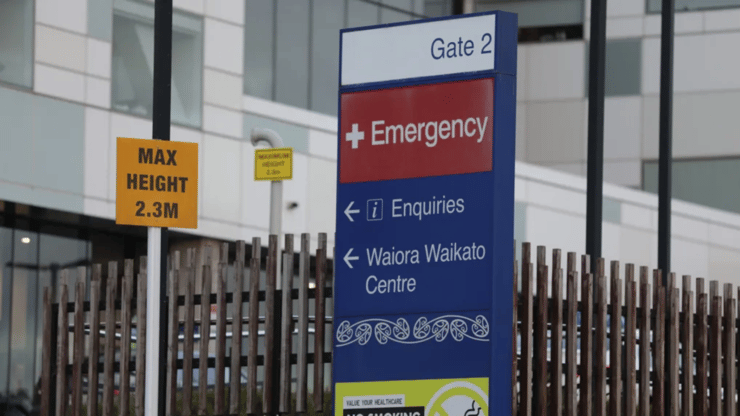Woman Says She Waited 16 Hours At Hospital ED

A woman waited more than 16 hours at Waikato Hospital's emergency department with suspected internal bleeding only to be referred back to her GP.
"An elderly man was in a wheelchair. His wife had gone up to the counter many times.
"He was shaking. His body was going into shock because he was in so much pain."
She said about 25 patients in the waiting room helped care for the man, lifting him out of the wheelchair and onto a more comfortable chair.
The man had suffered a heart attack earlier in the day.
"They got sent up here via ambulance and he'd had a few more heart attacks while sitting here and they were just waiting for hours."
Another case involved a pedestrian hit by a car.
"It took about 12 hours for her to get an ultrasound that the police requested she get."
Another patient waited 90 minutes in an ambulance before even being brought into the waiting room.
"They're telling people when they come in it's a seven-hour wait, but it's actually about 27 hours."
A source close to the ED said patients were not being seen in primary care or could not afford it so larger numbers were arriving in ED much sicker.
They said Waikato ED had lost experienced nurses, its IT systems were outdated and inefficient, and there were backlogs on the wards because there were not enough community care beds available such as in rest homes and mental health settings.
"Wait times are very bad, sometimes up to 10 or 12 hours to see a doctor even with the most serious conditions.
"We've had critical incidents of people being unable to get into a bed and becoming very unwell in the wait room."
They said patients could be in an ED bed for up to 48 hours without being able to get onto a ward, which meant ED staff could not access new patients.
"So sometimes there's up to 50 people in the wait room with one or two nurses looking after them so the staff are burnt out and not able to give care properly.
"A lot of us are trying to do the best we can while we're at work. But a lot of us are very frustrated. We're very angry. There's such a disconnect with Te Whatu Ora."

Sarah Dalton said there were significant staffing shortages at Waikato Hospital but in ED and other parts of the hospital. Photo: RNZ / Nick Monro
Association of Salaried Medical Specialists (ASMS) executive director Sarah Dalton said the woman's experience was "unfortunately" increasingly common throughout the country.
"We know that there are significant staffing shortages both in ED and other parts of the hospital which make it harder to see patients in a timely fashion or... admit them to the appropriate ward.
"I don't know what has to happen to get the message through to Te Whatu Ora leadership and ultimately the government that our health system, our hospitals, in particular key services like ED and mental health services, (must be) more appropriately resourced - I just don't know what it's going to take."
Dalton said vacancies were not being filled making the situation "near enough" to a recruitment freeze.
"That tells me that health leaders are more concerned about budgets and balance sheets than they are about caring for people.
"The sad story is that many people are going to have to wait for a very long time to be seen.
"This is obviously something that is very distressing for patients. It's also very distressing for the staff that want to care for them."

Dr Shane Reti said he planned to visit Waikato Hospital soon to discuss its challenges with frontline staff. Photo: RNZ / Reece Baker
Health Minister Dr Shane Reti acknowledged New Zealanders were often waiting a long time in EDs, particularly in winter.
"That's why this government has introduced a target that 95 percent of patients are admitted, discharged or transferred from an ED within six hours.
"I have also set up a Ministerial Health Workforce and System Efficiencies Committee, led by Dr Andrew Connolly, to provide me with regular insights advice about our health workforce directly, without being filtered through layers of officials."
Reti said he planned to visit Waikato Hospital soon to discuss its challenges with frontline health workers.
Health New Zealand Te Whatu Ora Waikato operations group director Michelle Sutherland said there hadn't been any extra demand at Waikato Hospital during the past few weeks.
She said during times when there were high numbers of acute patients, non-urgent cases could face extended waits.
"In those instances we encourage non-urgent patients to seek treatment in an appropriate clinical setting such as an after-hours provider or with their GP."





